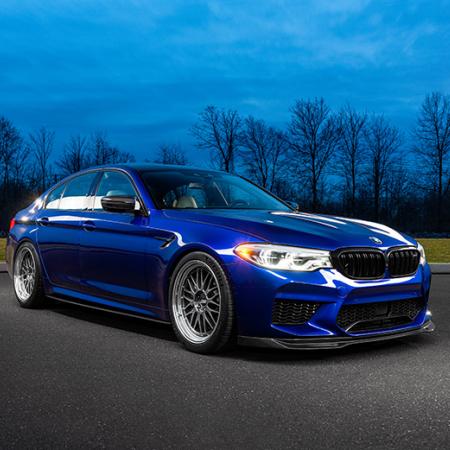Hardly a day goes by without another report about auto manufacturers announcing new initiatives regarding electric mobility, diesel and gasoline powerplants, and self-driving cars. If it's not that, then carmakers are responding to accusations of corporate malfeasance or, as in the case of Volkswagen and possibly others, actual illegal activity to circumvent emissions requirements. Perhaps that's why BMW Group CEO Harald Krüger made a comprehensive statement during his 2nd quarter conference call interim report on August 3, 2017.
Krüger started by defending BMW diesels, pointing out that they have lower CO2 emissions and that BMW diesels that meet Euro 5 and Euro 6 standards emit 40 percent less nitrogen oxides (NOx) than the German average, according to Germany's Federal Environmental agency earlier this year.
In addition, BMW has established a fund to provide European Union owners of older diesels (Euro 4 or before) up to €2,000 ($2,350) to upgrade to a BMW i3, a BMW or Mini plug-in hybrid model, or a BMW or Mini that meets the newer Euro 6 standards with CO2 emissions up to 130 grams per kilometer. The BMW Group is also offering to optimize the exhaust treatment system for 225,000 Euro 5 models in Germany, The upgrade is free.
Krüger continued, emphasizing that BMW has not rigged its vehicles to be able to pass emissions tests. He affirmed, "This has been confirmed by the results of relevant official investigations at the national and international level. And our customers can continue to rely on this."
From the topic of diesels, Krüger moved on to "sustainable mobility" meaning electrified vehicles. He noted that BMW was an early player in the electric vehicle market and currently more than 150,000 electrified BMWs and Minis are on the road.
Speaking to business operations, Krüger pointed out that in the first half of 2017, BMW Group sales and earnings have hit all-time highs, including the most vehicle deliveries ever in a six-month period. More than 1,200,000 BMWs, Minis, and Rolls-Royces went to customers. More than 1,000,000 of them were BMW-branded vehicles, led by the X family of vehicles and the G11/G12 7 Series Sedans.
The CEO reported that BMW Group pre-tax earnings reached a new high of more than €6,000,000,000 ($7,054,260,000), while for the 29th consecutive quarter, its earnings before interest and taxes (EBIT) stayed within the Group's target range of 8 to 10 percent. He noted that in a global automotive market with only slight growth, BMW was able to achieve its target because of its balanced distribution of sales in Europe, Asia, and the Americas.
Krüger wrapped up his financial analysis with a projection that the Group would show new all-time highs in both sales and earnings before tax for the entire financial year 2017.
Finally, Krüger spoke about the future; specifically the company's Strategy Number One > Next. Electro-mobility is clearly the group's priority. Sales of 42,500 electrified vehicles in the first half of 2017 represent a whopping 80 percent jump over the same period last year.
Krüger stated that BMW is the market leader in premium plug-in hybrids. The Group offers nine electrified models, including the all-electric BMW i3 and a growing number of plug-in hybrids. He reiterated his belief that the company will sell 100,000 electrified vehicles this year. BMW is already taking orders for the BMW i8 Roadster plug-in hybrid due out next year, and it expects the all-electric BMW X3 coming in 2020 will be a hit.
During his statement, Krüger confirmed that the first all-electric Mini would be built in England in 2019 at Mini's home factory in Oxford. Currently, ten BMW plants produce electrified vehicles. Krüger noted that the BMW Group is updating its manufacturing infrastructure so that going forward nearly every factory will be able to build vehicles powered by internal-combustion engines, plug-in hybrid technology, and all-electric drivetrains—on a single production line.
Krüger also reminded everyone that its plant in Dingolfing in Lower Bavaria would be the home of the BMW iNext, which will become the company's technology flagship when it arrives in 2021 as an autonomous electric vehicle.
BMW's future also relies on autonomous driving, which Krüger listed as its second major area of activity. He did not list the development status of self-driving vehicle projects, but did point out that rapid progress is being made along with partners Intel, Mobileye, Delphi, and Continental. This year, he said, engineers from the BMW Group, Intel, and Mobileye will move into the Group's new development campus near Munich.
Finally, Herr Krüger teased everyone on the conference call—and all of the rest of us—with this: "At the IAA in Frankfurt, we will present a very exciting surprise."
The Frankfurt International Motor Show, also known as the IAA, will run from September 14 to 24, 2017. With dozens of new models in the works, some of which may only be months away from an official launch, Krüger has plenty of potential surprises from which he could choose. We hope it's a big one.—Scott Blazey
[Photo courtesy of BMW AG.]












